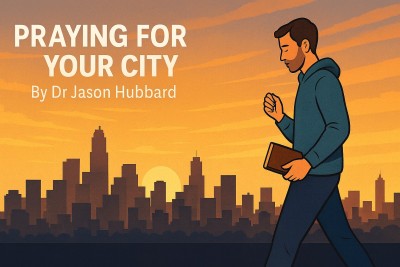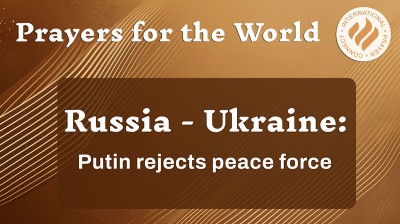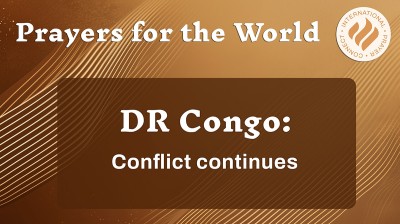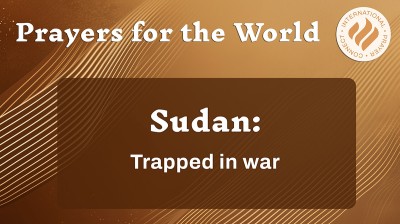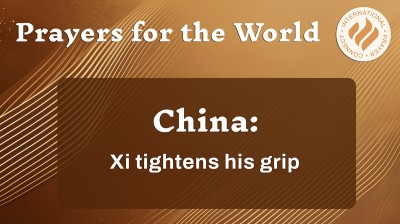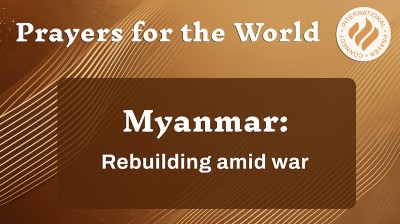Praying for Your City – Encouraging the Prayer Warriors!
By Dr. Jason Hubbard
“Seek the welfare of the city where I have sent you into exile,
and pray to the LORD on its behalf, for in its welfare
you will find your welfare.” - Jeremiah 29:7
Beloved, our God calls us to lift up our cities in prayer. Your street, your neighborhood, your town, or your city is not random —  it is your assignment from the Lord! Acts 17:26 tells us that God “determined allotted periods and the boundaries of their dwelling place,” which means you are living where you are by divine appointment.Your presence is not accidental. You are planted there for Kingdom purposes — to shine as a light (Matthew 5:14–16), to proclaim the Good News of Jesus (Luke 4:18–19), and to intercede until your city sees His glory (Habakkuk 2:14).
it is your assignment from the Lord! Acts 17:26 tells us that God “determined allotted periods and the boundaries of their dwelling place,” which means you are living where you are by divine appointment.Your presence is not accidental. You are planted there for Kingdom purposes — to shine as a light (Matthew 5:14–16), to proclaim the Good News of Jesus (Luke 4:18–19), and to intercede until your city sees His glory (Habakkuk 2:14).
As you pray, the Lord responds and you can see the spiritual atmosphere shift over your city! When Daniel prayed for Babylon, angelic forces were released (Daniel 10:12–13). When the early church prayed in Jerusalem, the place was shaken, and they were filled with boldness to preach Christ (Acts 4:29–31). When Paul and Silas prayed in Philippi, prison doors opened and salvation came to a whole household (Acts 16:25–34).
Why Pray for Your City?
- Because God loves your city. Jesus wept over Jerusalem (Luke 19:41–42). His heart is moved for the lost, the broken, the trafficked, the orphaned, the widow, the poor, and the peoples of your city in need of Hope for their future and forgiveness for their past!
- Because the enemy seeks to destroy your city. Satan is described as the thief who “comes only to steal and kill and destroy” (John 10:10). His schemes target cities — sowing division, violence, injustice, idolatry, and immorality.
- Because the Gospel is for every tribe, tongue, and nation living in your city! Jesus declared in Matthew 28:18–20 that we are to make disciples of all nations. The nations live in our cities – Jesus desires that every people in every place are called to be his ‘disciples.’ That includes the unreached families on your block, the immigrant communities in your city, and the children growing up without hope.
So, how can we take our stand as prayer warriors for our cities? Let me share some tools, guidelines, and encouragement.
1. Pray the Word Over Your City
“All Scripture is God-breathed and is useful for teaching, rebuking, correcting and training in righteousness” (2 Timothy 3:16). God’s Word is the most powerful prayer manual ever written!
- Pray the Lord’s Prayer: “Your kingdom come, Your will be done, on earth as it is in heaven” (Matthew 6:10). Insert the name of your city: “Father, let Your Kingdom come in Bristol as it is in Heaven!”
- Pray apostolic prayers: Ask for a spirit of wisdom and revelation (Ephesians 1:17), for love to abound (Philippians 1:9),and for the Word of the Lord to spread rapidly and be honored (2 Thessalonians 3:1).
- Pray promises of revival: “For the earth will be filled with the knowledge of the glory of the LORD as the waters cover the sea” (Habakkuk 2:14). I included 25 Global Promises that you can use to pray for your city!
When you pray Scripture, you are agreeing with God’s eternal purposes. As Hudson Taylor said, “When we work, we work; but when we pray, God works.”
2. Develop a Lifestyle of Prayer for Your City
Paul exhorts us to “pray without ceasing” (1 Thessalonians 5:17). That doesn’t mean constant talking, but constant awareness and fellowship with the Lord. Here are some simple ways to cultivate intercession:
- Create a prayer list for your city — list your mayor, council, schools, hospitals, police, local churches, and unreached groups.
- Set a regular time to pray daily for your city. Even 15 minutes can shape the destiny of thousands.
- Fast for breakthrough — “This kind does not go out except by prayer and fasting” (Matthew 17:21).
Remember, prayer is not just asking — it is intimacy. As you delight in God, His heart for your city will become your heart (Psalm 37:4). As you “See your City,” you will grow in love for your city! As God begins to respond to your prayers, you will begin to ‘See God in your City.”
One Church – One Day: Here is a great video story from a small town in Eugene Oregon that is beginning to see God move powerfully in their city! -

 3. Prayer-Walking Your Streets
3. Prayer-Walking Your Streets
Prayer-walking is simple: walk through your city or village and pray on-site with insight.
- Pray blessing, not cursing (Luke 6:28). Speak peace to homes and businesses.
- Pray Scripture aloud — declare God’s promises over schools, hospitals, and government buildings.
- Listen as you walk — ask the Spirit for discernment: what spiritual strongholds need to be torn down? What opportunities for blessing can you proclaim?
- Go two by two — Jesus sent His disciples in pairs (Luke 10:1). Prayer is strengthened in agreement (Matthew 18:19–20).
As you walk, expect God to give you divine appointments. Carry tracts, a listening ear, and a ready heart to share Jesus with those you meet.
See this free downloadable Prayer-Walking Guide for Prayer Warriors!
And this superb reminder of God’s Promises
4. Go and Make a Difference
Prayer without obedience is incomplete. The Great Commission calls us not only to pray but also to go (Matthew 28:19). As you intercede for your city, the Lord may stir you to practical action:
- Volunteer at a food bank or refugee center.
- Mentor at-risk youth.
- Serve in your local church’s outreach team.
- Advocate for justice in your city (Isaiah 1:17).
Prayer fuels mission, and mission fuels prayer. As you serve, you’ll find your prayers becoming sharper, your compassion deeper, and your hope stronger.
 5. Encouragement for the Prayer Warriors
5. Encouragement for the Prayer Warriors
Beloved, do not grow weary. Jesus told the parable of the persistent widow “to show them that they should always pray and not give up” (Luke 18:1). Prayer is the evidence of faith. It proves we believe God is at work in our city.
- Your prayers are incense before the throne. “The smoke of the incense, with the prayers of the saints, rose before God” (Revelation 8:4).
- Your prayers release angelic activity. Daniel’s prayers moved heavenly armies (Daniel 10:12–13).
- Your prayers bring justice. “Will not God bring about justice for his chosen ones, who cry out to him day and night?” (Luke 18:7).
Satan fears nothing more than a praying church. The devil wants to convince you your prayers don’t matter. But James 5:16 declares, “The prayer of a righteous person is powerful and effective.”
6. A Vision for a Praying City
What would it look like if your city became a house of prayer? Imagine 24/7 worship rising like incense (Malachi 1:11). Imagine watchmen posted on the walls of your city, crying out until it becomes “a praise in the earth” (Isaiah 62:6–7). Imagine the lost saved, families restored, schools transformed, leaders filled with wisdom, and the Gospel proclaimed to every person.
This is not a fantasy — it is God’s heart! He promised: “Ask of me, and I will make the nations your heritage, and the ends of the earth your possession” (Psalm 2:8).
 Conclusion: Until He Comes
Conclusion: Until He Comes
Prayer warriors, lift your eyes. The day is coming when Jesus will reign over every city (Revelation 21:24). Until then, take your stand on the walls. Intercede day and night. Walk your streets.
Pray His Word.
Love your neighbors.
Preach the Gospel.
You are God’s watchmen, His intercessors, His ambassadors. Do not despise the day of small beginnings (Zechariah 4:10). Even your weakest prayer, joined to His infinite power, can topple strongholds and usher in revival.
Let us be those who “seek the welfare of the city” (Jeremiah 29:7), who stand in the gap (Ezekiel 22:30), and who persevere until our towns, villages, and cities shine with the light of Christ.
“For the LORD will arise upon you, and His glory will be seen upon you. Nations shall come to your light, and kings to the brightness of your rising” (Isaiah 60:2–3).
Until He comes,
Dr. Jason Hubbard – Director
International Prayer Connect
At a summit in Paris, 26 allies of Ukraine committed to forming a “reassurance force” to secure the nation immediately after any ceasefire. French President Emmanuel Macron said the initiative would involve troops deployed “by land, sea or air” to ensure stability, though he stressed they would not engage Russia directly.
Russian President Vladimir Putin dismissed the plan outright, warning that any foreign troops deployed to Ukraine would be seen as “legitimate targets.” His spokesman added that even discussion of such forces was a provocation, despite assurances from Western leaders that the deployment would be defensive and symbolic rather than offensive.
The push for guarantees follows recent talks in Alaska, where U.S. President Donald Trump met with Putin and raised hopes of advancing toward a peace agreement with Ukrainian President Volodymyr Zelensky. Yet Putin cast doubt on meaningful progress, saying it was “nearly impossible” to reach agreement with Kyiv on major issues.
Despite his scepticism, Putin maintained he was open to dialogue with Zelensky, even offering Moscow as a summit location, a proposal Kyiv quickly dismissed as unserious. Ukrainian officials prefer neutral ground and continue to insist on a ceasefire as a precondition to wider peace discussions.
Western leaders remain wary that Russia is stalling for time to secure more territorial gains. Putin, who also met this week with China’s Xi Jinping and North Korea’s Kim Jong Un, insisted his forces were “pushing forward on all fronts.”
NATO Secretary General Mark Rutte pushed back on Moscow’s warnings, stating, “Why are we interested in what Russia thinks about troops in Ukraine? It’s a sovereign country. It’s not for them to decide.”
The debate highlights the difficulty of ensuring Ukraine’s future security. While allies stress their commitments are defensive and long-term, Russia insists they are a threat. For Ukrainians, the cost of delay remains high, as the war grinds through its fourth year, with millions displaced and entire cities reduced to rubble.
The uncertainty underscores a broader question: can peace be built through guarantees and deterrence alone, or must trust and reconciliation play a deeper role?
Prayer Pointers
- Pray: for leaders to prioritize genuine peace over political posturing, that diplomacy would not be derailed by pride. “Blessed are the peacemakers, for they will be called children of God.” Matthew 5:9
- Pray: ask God to protect the innocent in Ukraine, especially the displaced and vulnerable, from further suffering and loss. “The LORD is a refuge for the oppressed, a stronghold in times of trouble.” Psalm 9:9
- Pray: that hearts hardened by war, whether Russian or Ukrainian, would be softened, making space for reconciliation and long-term stability. “You are the light of the world. A town built on a hill cannot be hidden.” Matthew 5:14
Prayer for God’s Shield over Ukraine
Lord, we lift Ukraine before You. Bring a halt to violence, shield the innocent, and raise up Your Church as a testimony of hope. Let peace that only Christ can give take root in this land. Amen
In eastern DR Congo, violence continues to cast a shadow over ongoing peace initiatives. Human Rights Watch reports that M23 rebels killed at least 140 civilians in July, including women and children, during one of the deadliest attacks since the group’s resurgence in 2021. Witnesses described harrowing scenes of machete and gun attacks across 14 villages near Virunga National Park. Some families were forced to bury their loved ones immediately, while others saw bodies thrown into rivers. Many victims were reportedly from the Hutu ethnic group, and the UN corroborates claims of wider killings potentially exceeding 300 during the same period.
Despite the ongoing peace process brokered by the US and Qatar, the M23 continues to challenge stability, with violations of ceasefire agreements reported. Both local communities and international observers have called for accountability, urging the UN and global actors to press for justice and impose sanctions where necessary. Rwanda has denied involvement in the attacks, asserting that M23 operates independently and pointing to concerns about the armed Hutu group FDLR.
Amidst the violence, diplomatic efforts continue. On September 3, the DR Congo and Rwanda reaffirmed their commitment to the June 2025 Peace Agreement during the second Joint Oversight Committee meeting. Representatives from the US, Qatar, Togo, and the African Union participated, addressing implementation delays and recent unrest. Steps highlighted included establishing a single independent joint secretariat to coordinate regional support, mechanisms for voluntary refugee returns, and a military and intelligence channel for sharing critical security information. Both governments committed to ceasing support for non-state armed groups and accelerating efforts to neutralize the FDLR.
Peace talks with M23 in Doha remain critical, though negotiations face challenges. The committee emphasized regular follow-ups to monitor progress, underscoring the shared responsibility of regional and international partners to uphold stability and protect civilians.
Prayer Pointers
- Pray: Protection for civilians and God’s safeguarding over families and communities affected by violence. “He will cover you with his feathers, and under his wings you will find refuge; his faithfulness will be your shield and rampart.” Psalm 91:4
- Pray: for the leaders and international bodies to act wisely, ensuring perpetrators are held responsible. “Learn to do right; seek justice. Defend the oppressed… “Isaiah 1:17
- Pray: the peace agreements to be fully implemented, and for hearts to be softened toward forgiveness and collaboration. “If it is possible, as far as it depends on you, live at peace with everyone.” Romans 12:18
Prayer – Lifting up communities
Father, we lift the people of eastern DR Congo and Rwanda to You. Protect families from harm, guide leaders with wisdom, and bring lasting peace and reconciliation to the region. Amen.
More: https://www.bbc.com/news/articles/c8x5y2zvzk0o and http://web.sabc.co.za/sabc/home/channelafrica/news/details?id=2ccaa30b-e8e7-4fc1-acd9-153c3990df79&title=DRC
Sudan’s civil war continues to produce one of the world’s most severe humanitarian crises as fighting enters its third year. The conflict between the Sudanese Armed Forces (SAF) and the Rapid Support Forces (RSF) has left tens of thousands dead from combat, disease, and hunger, while millions have been displaced. Families struggle to survive amid the chaos, with children suffering the brunt of malnutrition and preventable illnesses.
In August, the SAF consolidated control over Khartoum and central and eastern regions, including the strategic port city of Port Sudan. The RSF, in turn, dominates much of Darfur and southern Kordofan and has allied with the Sudan People’s Liberation Movement-North (SPLM-N) to expand influence. RSF attacks on North Darfur’s capital, el-Fasher, threaten the city’s last SAF garrison and have trapped approximately 260,000 civilians, including 130,000 children. Satellite imagery shows sand berms encircling the city, creating a “kill-box” effect, with civilians caught in crossfire and with limited avenues for escape.
Many families survive on minimal food sources such as ambaz, a paste made from pressed oil seeds, yet supplies are dwindling. In Mellit, one-third of children are severely malnourished, reaching emergency thresholds defined by the World Health Organization. Cholera outbreaks in Darfur have claimed hundreds of lives and infected over 9,000, compounding the humanitarian crisis. Aid convoys from the United Nations and NGOs rarely reach affected areas due to roadblocks, attacks, and bureaucratic delays, including a recent drone strike on a UN convoy in North Darfur. South Kordofan faces similar hunger crises due to RSF sieges on Dilling and Kadugli.
Politically, RSF leader Mohamed Hamdan “Hemedti” Dagalo was sworn in as president of a parallel “Peace government” in Nyala, South Darfur, coinciding with SAF drone strikes on the city. Reports suggest secret discussions in Switzerland between SAF Commander-in-Chief Abdel Fattah al-Burhan and a US adviser to explore pathways to peace, followed by the retirement of senior officers linked to Sudan’s former Islamist government.
Civilians remain at extreme risk as the war continues. The international community is being urged to intensify humanitarian aid, press for accountability, and ensure that ceasefires are implemented to protect those trapped in conflict zones.
Prayer Pointers
- Pray: for God’s safeguarding over families trapped in conflict zones, that children and vulnerable communities would find refuge and safety. “The Lord will keep you from all harm—he will watch over your life.” Psalm 121:7
- Pray: and ask the Lord to bring peace to Sudan for God to soften hardened hearts, ending cycles of revenge and hatred.
- Pray: for the Church in Sudan for the to remain steadfast, bringing hope and comfort to those in despair.
Prayer – for Sudan’s Children and Families
Lord, we lift up the people of Kordofan. Protect the innocent, comfort the grieving, and bring an end to bloodshed. Raise Your Church to shine as a beacon of hope, and let Your peace touch this broken land. Amen
More: https://www.aljazeera.com/news/2025/8/31/sudan-august-update
Iranian state media has accused at least 54 Christians of espionage, claiming that their religious activities abroad and possession of Bibles constitute “anti-security” behaviour. The broadcast included footage of Bibles being transported into the country, images of gatherings, and coerced confessions of some detainees, creating the impression of a faith community aligned with foreign intelligence.
These accusations were aired before any trial, raising serious concerns about due process and the right to a fair defence. The state’s narrative risks framing everyday Christian practices including prayer, worship, baptisms, and possession of Scripture, as criminal acts. Presenting evangelical believers as traitors fuels societal hostility and deepens the persecution of Persian-speaking Christians in Iran.
Open worship remains severely restricted in the country, forcing many to meet in secret. Despite these pressures, believers continue to gather quietly, sharing faith and Scripture under immense personal risk. Observers note that this escalation is consistent with Iran’s ongoing pattern of monitoring and suppressing Christian activity, highlighting the need for international attention and support.
The World Watch List ranks Iran as the ninth most challenging country for Christians, reflecting the heightened risks of imprisonment, interrogation, and harassment faced by those practicing their faith openly. Human rights groups emphasize that the allegations of espionage are unfounded and serve as a pretext for suppressing religious freedom.
The global church is called to stand in solidarity with these believers—praying for protection, courage, and endurance. Advocacy for due process, freedom to worship, and international pressure to uphold human rights are critical in supporting Christians under persecution in Iran. The situation underscores the ongoing need for awareness and prayer, as well as practical support for families and house churches navigating life under constant threat.
Prayer Pointers
- Pray: for God’s safeguarding over Christians facing imprisonment and false accusations. “The angel of the Lord encamps around those who fear him, and he delivers them.” Psalm 34:7
- Pray: for courage, endurance, unwavering faith and strength for those meeting secretly to worship. "Have I not commanded you? Be strong and courageous. Do not be afraid; do not be discouraged, for the Lord your God will be with you wherever you go.” Joshua 1:9
- Pray: that authorities uphold truth and justice, and that the global community champions religious freedom. “When justice is done, it brings joy to the righteous but terror to evildoers.” Proverbs 21:15
Praying - Strength for the faithful in Iran
Lord, protect Your children in Iran. Give them courage, endurance, and peace as they practice their faith in the face of threats. Amen.
More: https://www.opendoorsuk.org/news/latest-news/iran-christian-spies/
Beijing has been showcasing its growing arsenal with a massive military parade led by Xi Jinping, displaying hypersonic missiles, stealth jets, and underwater drones. With Vladimir Putin and more than 20 world leaders in attendance, the event highlights China’s ambition to rival U.S. military power by mid-century.
But behind the polished display lies unease. Over the past two years, more than two dozen senior officers and defence industry executives have vanished from public life in what is widely seen as Xi’s most sweeping military purge yet. The move reflects concerns about corruption, loyalty, and the readiness of the People’s Liberation Army (PLA). Experts warn that endemic graft threatens China’s ability to carry out a potential invasion of Taiwan, something Xi has ordered the PLA to be prepared for by 2027.
Since taking power in 2012, Xi has relentlessly reshaped the military. He invoked Mao’s principle that “the party commands the gun,” dismantled patronage networks, and emphasized absolute loyalty to his leadership. Under his watch, China has built the world’s largest navy, quadrupled its nuclear stockpile, and made significant advances in missile and aircraft technology. Once reliant on outdated Russian designs, Beijing now develops cutting-edge weapons of its own.
Xi frames these reforms as essential to achieving his “China Dream” - a vision of national rejuvenation that includes reclaiming Taiwan and standing shoulder to shoulder with the United States as a global power. For Xi, military strength underpins not only China’s external ambitions but also the Communist Party’s internal legitimacy amid slowing economic growth.
The purge underscores both his consolidation of power and his determination to ensure the PLA is loyal, disciplined, and capable of “fighting and winning wars.” Analysts say this is not a sign of weakness but of Xi’s confidence, as he enters the next phase of military modernization.
For the U.S. and its allies, the challenge is clear: China is rapidly closing the gap, and its reforms make the PLA a formidable adversary. The parade may be a display of might, but the ongoing anti-corruption drive reveals a deeper truth - Xi’s iron grip on the military is central to his quest for dominance at home and abroad.
Prayer pointers
- Pray: for truth and justice to prevail in China’s military ranks. “Whoever walks in integrity walks securely, but whoever takes crooked paths will be found out.” Proverbs 10:9
- Pray: ask the Lord to restrain conflict and turn ambitions away from destruction. “He makes wars cease to the ends of the earth. He breaks the bow and shatters the spear; he burns the shields with fire.” Psalm 46:9
- Pray: for ordinary citizens to find security, stability, and ultimately, the knowledge of Christ. “Also, seek the peace and prosperity of the city to which I have carried you into exile. Pray to the Lord for it, because if it prospers, you too will prosper.” (Jeremiah 29:7)
Prayer for China’s military and leaders
Lord, we ask that You expose corruption, restrain aggression, and guide China’s leaders toward peace instead of pride and conflict. Amen.
More: https://www.washingtonpost.com/world/2025/09/02/china-xi-jinping-military-purge/
Myanmar continues to struggle with recovery from the devastating 7.7-magnitude earthquake in March, which claimed more than 3,800 lives, even as civil war persists between the military-led government (Tatmadaw) and pro-democracy forces. The disaster compounded an already dire humanitarian situation: prior to the quake, over 3.5 million people were displaced, and roughly 20 million required assistance due to ongoing conflict.
In the hardest-hit areas, recovery is painstakingly slow. Workers like seamstress Thae Mama Swe comb through rubble in search of missing loved ones, while engineers attempt to restore roads, bridges, hospitals, schools, and other critical infrastructure. In Mandalay and the capital, Naypyitaw, crews repair damaged government buildings, including the main parliament, aiming to prepare for elections scheduled in December. However, critics question the legitimacy of these elections under military rule.
Military airstrikes and attacks continue despite a temporary ceasefire, further delaying aid deliveries. Insurgents also remain active, complicating efforts to reach those in need. Temporary bridges and manual road repairs illustrate the immense challenge of rebuilding in conflict zones. Hospitals, pagodas, homes, and other vital structures were destroyed, and the country faces shortages of supplies, equipment, and experienced personnel.
International assistance is limited. Western sanctions and cuts to aid, combined with reliance on China and Russia for trade, have restricted Myanmar’s ability to rebuild. U.N. officials stress that the military must allow humanitarian access and halt attacks on civilians to prevent further suffering. Despite these obstacles, officials and citizens remain committed to restoring vital services and hope to construct earthquake-resilient buildings to protect future generations.
The ongoing civil war has slowed reconstruction, but recovery efforts continue. Amid grief, loss, and widespread destruction, Myanmar’s people display resilience and determination, striving to rebuild lives while navigating the dual crises of natural disaster and armed conflict.
Prayer Pointers:
- Pray: for God’s safeguarding over families and communities facing ongoing violence and disaster. "He will cover you with his feathers, and under his wings you will find refuge; his faithfulness will be your shield and rampart." Psalm 91:4
- Pray: for essential resources, humanitarian access, and skilled help to reach affected areas efficiently. "And my God will meet all your needs according to the riches of his glory in Christ Jesus." Philippians 4:19
- Pray: for the reconstruction of homes, schools, hospitals, and infrastructure, and for wisdom in creating resilient communities. “Let us rise up and build.” Nehemiah 2:18
Prayer - Standing with Myanmar
Lord, be the refuge and strength for all affected in Myanmar. Bring comfort to those grieving and strength to those rebuilding. Restore lives, protect the vulnerable, and bring peace amid conflict. Amen.
More: https://abcnews.go.com/International/wireStory/ap-visit-myanmar-highlights-struggle-rebuild-after-earthquake-125244807
By Tom Victor
September 5th marked the U.S. and Canada Premiere of the new movie - Light of the World.
It is a beautifully hand-drawn animated film that follows Jesus’ life through the eyes of young John, powerfully sharing the Gospel message of love, hope, and salvation with children and families worldwide.
It is scheduled for release in 30 more nations before the end of 2025. The film will be translated into 500+ languages.
The film’s makers' vision is for the movie to nurture new and existing believers through free Gospel discipleship materials. A Gospel invitation and QR code are displayed on screen at the end of the film to encourage people to respond.
The IPC and 2BC families have been praying for the success of this remarkable film and for many children and adults across the world to be reached with its Gospel message.
Who is behind Light of the World?
The Salvation Poem Project has created Light of the World. Perhaps you’ve heard of them as the Salvation Poem is at the end of every Superbook episode and is available in almost 100 languages.
2BC and Shine!
 ‘Rise, shine, for your light has come, and the glory of the Lord rises upon you.’ (Isaiah 60:1)
‘Rise, shine, for your light has come, and the glory of the Lord rises upon you.’ (Isaiah 60:1)
On Tuesday, August 19, children from 20 nations took turns leading our first 24 hours of “on-line” prayer in our 2BC Prayer Room. Many others joined them “off-line” as well. They were part of the newly established Shine Project.
The vision of Shine! is to be praying for children (and adults) to know Jesus, boldly share His love, and for the Light of the World movie to impact families and nations with the Gospel. Watch the Trailer!
The first Shine 24 hour event was so successful that due to popular demand, we are holding a second one! -
Shine! – 24 Hours of Prayer for the Light of the World’
September 23, 2025
Starts: 00:00 EST | 06:00 CEST | 12:00HRS SGT
Shine! is a 24-hour global celebration of Jesus, hosted by children, families, churches and ministries across every continent. We’re lifting up the name of Jesus and praying for the success of the upcoming “Light of the World” movie – a powerful Gospel film being translated into hundreds of languages.
Continuous online Zoom sessions and offline local gatherings will blend worship, intercession, creativity and child-led passion. Children will pray boldly, worship joyfully, and share Jesus faithfully!
You can join an hour online or lead your own gathering at home or church using our free Shine! Small Group Pack. Let’s raise a wave of worship and intercession that covers the earth - through the voices of the next generation!
Why is our 2BC Family partnering with this movie?
2BC has three core values. 1) Children Hearing the Voice of their Heavenly Father; 2) Children Knowing their Identity in Christ; 3) Children Empowered by God’s Spirit to Share His Love with Others. Light of the World is a powerful resource to help children – both the little ones and the older ones - become 2BC Champions as they discover their identity and share the message of God’s love with others in their neighborhood and around the world.
The Shine Project has created several free resources to help children Shine! as 2BC Champions in support of this movie, including a Prayer Guide, B.L.E.S.S. Cards, God’s Favorite and Shine Songs. There are some exclusive Light of the World resources launching this week too!
You can find them all at: https://www.2bc.world/shine/

Is the Shine Project for me?
You can only qualify for the Shine Project if:
- You are a child;
- You love children;
- You were a child at some time in your life.
If any of these apply, Light of the World and the Shine Project is for You!!! Check it out!
Here’s a music video by Shane and Shane with movie segments that can help you decide:
More info, Resources and Sign-up
www.2bc.world/shine
2BC: Every Child - Everywhere - On Mission - With God!
